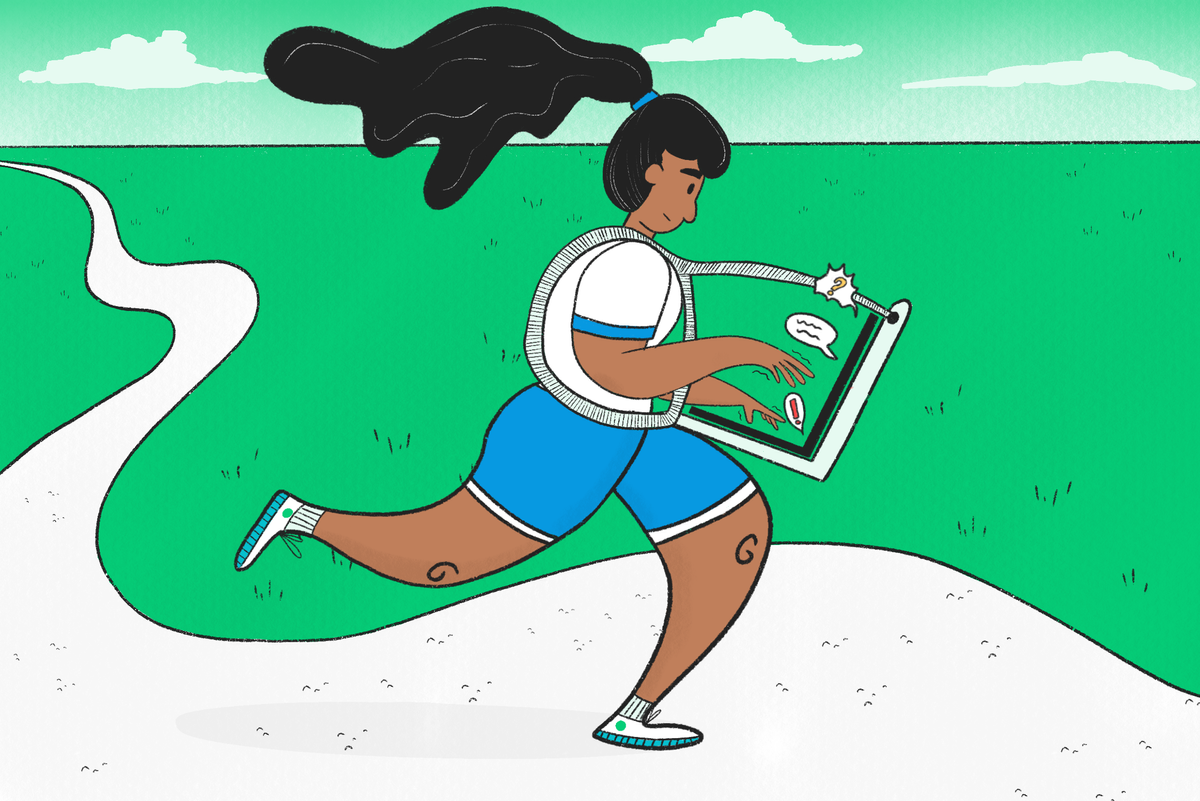Tips on Becoming Resilient in the Face of Setbacks
Reframing the mindset of creator success in the age of today.

This journey in pursuit of creative independence is not a linear path and is filled with highs and lows. What one creator considers "success" may differ from what another creator deems successful. Thus, when embarking on launching your own independent creative project, there is always a possibility that the goal you had envisioned may not be achieved on the first attempt, and that’s okay. For various reasons, particularly in the crowdfunding space, your campaign may not reach its funding goal on the first try. However, it is imperative that entrepreneurs and creators understand that obstacles are an unavoidable part of the process, and we shouldn’t shy away from talking about setbacks. So let’s talk about them!
It’s easy for a setback to shake you up a bit or discourage you but instead, let’s use them as an opportunity to learn and grow. In this article, we will discuss the importance of resilience in the face of disappointment, share practical strategies for regrouping after an unsuccessful crowdfunding campaign, and interview a tech creator who launched their first Kickstarter campaign after seven years of attempting to get it off the ground. So, if you're feeling discouraged after your latest project fell short of its goals, take heart - there are still ways to turn it around! And if you haven't started yet, it's time to begin your project.
I would love for setbacks to be viewed with a smile. Not a smile to celebrate the fact that a challenge has arisen, but a smile celebrating the tenacity of the innovator who perseveres. - Travis Thul, Creator of The Ramen Now
Setbacks are a part of the Journey
Experiencing disappointment can provide an opportunity to learn and grow. In the case of an unsuccessful crowdfunding campaign, instead of feeling disheartened or giving up altogether, it's essential to analyze what went wrong and make necessary changes for your future creative endeavors.
Was the marketing strategy sufficient? Should I have looked at other campaign pages to gain ideas? Was the funding goal amount too ambitious? Was my campaign page comprehensive? Were there gaps in my story that didn't engage my backers to take action? Was the decision to go live rushed? Did I create quality images and videos? Should I have enlisted the help of digital marketing experts?
By reflecting on where things went wrong and adjusting your strategies accordingly, you can increase the likelihood of success in future projects. Even if your crowdfunding campaign doesn't reach its goal, it doesn't mean that you should give up on your project or take it as a sign that you're not cut out for creative freedom. After all, many creators have relaunched the same campaign ideas with some tweaks — lower goal, better production of assets, more social media promotion — and have been successful the second time around. So don't let one unsuccessful campaign stand in your way!
It's natural to feel discouraged after a crowdfunding campaign isn't successful. However, this doesn't have to be the end of your journey. By examining and learning from what didn't work, leveraging existing networks, and taking risks on new opportunities, creators can use this experience as an opportunity for growth. With the right attitude and perseverance, failure can become a powerful tool in finding success with future campaigns.
Tips from Tech Creator, Travis Thul of RamenNow
Tech Inventor and first-time Kickstarter creator, Travis Thul created the Ramen Now — the world's first patented desktop device designed to rapidly cook your ramen noodle soup and other delicious dehydrated meals. You may see a new Kickstarter campaign, but this product has been in development for over seven years. The product never came to fruition due to several challenges, including lack of funds and manufacturing issues but this didn’t stop Travis, which is why we wanted to chat with him about the mindset it requires to be resilient.
Q: How do you define success, failure, and resilience?
A: Man, I think sometimes those three outcomes aren't necessarily mutually exclusive and can even be complimentary. Or, maybe, embracing small failures while working towards success is the definition of resilience? In our case, we certainly found many paths towards failing to license our intellectual property for the Ramen Now!, while also experiencing the highs of successfully cold calling prospective partners, receiving offers to pitch to C-Suite executives, gaining support from the University of Wisconsin's Law & Entrepreneurship Clinic, and getting awarded numerous patents. In that case, I think I would define the journey as having had many small successes, though the initial destination certainly felt like a failure. Perhaps the resilience component is the willingness to accept the potentiality of defeat while simultaneously embracing the thrill of getting back up on the horse (metaphorically speaking).
Q: The Ramen Now has been a project over seven years in the making. What advice do you have for aspiring inventors to maintain their motivation and resilience over the long term?
A: I would advise all inventors that they accept - up front - that they may fail. I would then advise that, once they fully internalize that likelihood, that they then continue forward undaunted. I would advise they see their mission not solely through the lens of profit and loss, but through the value of a life experience...a story to tell. To never give up their dreams...even if they've accepted failure (as we had). Our team has not made one dollar off the Ramen Now!, but I relish sharing the concept and story with peers. True, there is always a tinge of pain when I have to admit the struggles, but it is dwarfed by the pride of explaining what has been an amazing journey.
Q: In what ways did your experiences with setbacks shape your approach to problem-solving and innovation?
A: We cold called every small kitchen appliance maker we could find. Probably a dozen or more. We received initial positive feedback from everyone. We were asked to present our prototypes to four. Three of those would give us a verbal commitment of partnership - only to be derailed during the discussion of additional significant investments from our team to bring the Ramen Now! to production. I would say that each company which responded to our cold calls with a "Thanks, but not our market segment" started out with a "Thanks." We focused on that small modicum of validation to get us to the next prospective partner. When National Presto initially offered to partner, we saw that as validation, even when we could not afford to buy down their risk. With each setback, we also saw vindication - if ever so small. That continued vindication validated our approach to persevering and problem-solving - at least until we were unable to identify prospective partners. It was that terminal point that then gave way to the idea that, just maybe, changing the angle and working with Freakonomics and Kickstarter may provide an alternative pathway to success.
Q: What role did your support network, such as friends, family, or colleagues, play in your ability to persist and innovate?
A: This is the easiest question - everybody, EVERYBODY - affirmed the utility and novelty of the Ramen Now! Every friend's mother consulted confirmed she would've purchased one as a graduation gift. Every co-worker would ask how they could buy one. This constant flow of positive feedback did have a countervailing force, as it made accepting our initial failure that much more painful. After all, if everybody knows that an idea will succeed, only for it not to, what does that say about those who have conceived of it?
Q: Reflecting on your journey, what are the key lessons or principles you'd like to share with others about resilience and determination in tech innovation?
A: Number one, I would make clear that physical hardware is hard. The reality of the manufacturing and distribution marketplace is that physical inventions typically have high overhead and are subject to more rigorous certification and production constraints than software of artistic works. This makes such ideas less likely to receive angel investing. For young inventors without access to capital or preexisting support networks, the path will be hard. That said, there are organizations like the University of Wisconsin's Law & Entrepreneurship Clinic which will support intellectual property development. There are mentors out there willing to help - if only they can be found. There are pathways to make progress.....if not a profit. I would also note the conventional wisdom that 90% of startups fail, 10% fail within the first year, and that 70% fail during years two through five. If an inventor is willing to accept that roadmap, then they can proceed with eyes wide open and enjoy the journey. Profit or not, it is a worthwhile adventure. Or, as Teddy Roosevelt said, "
It is not the critic who counts; not the man who points out how the strong man stumbles, or where the doer of deeds could have done them better. The credit belongs to the man who is actually in the arena, whose face is marred by dust and sweat and blood; who strives valiantly; who errs, who comes short again and again, because there is no effort without error and shortcoming; but who does actually strive to do the deeds; who knows great enthusiasms, the great devotions; who spends himself in a worthy cause; who at the best knows in the end the triumph of high achievement, and who at the worst, if he fails, at least fails while daring greatly, so that his place shall never be with those cold and timid souls who neither know victory nor defeat.
